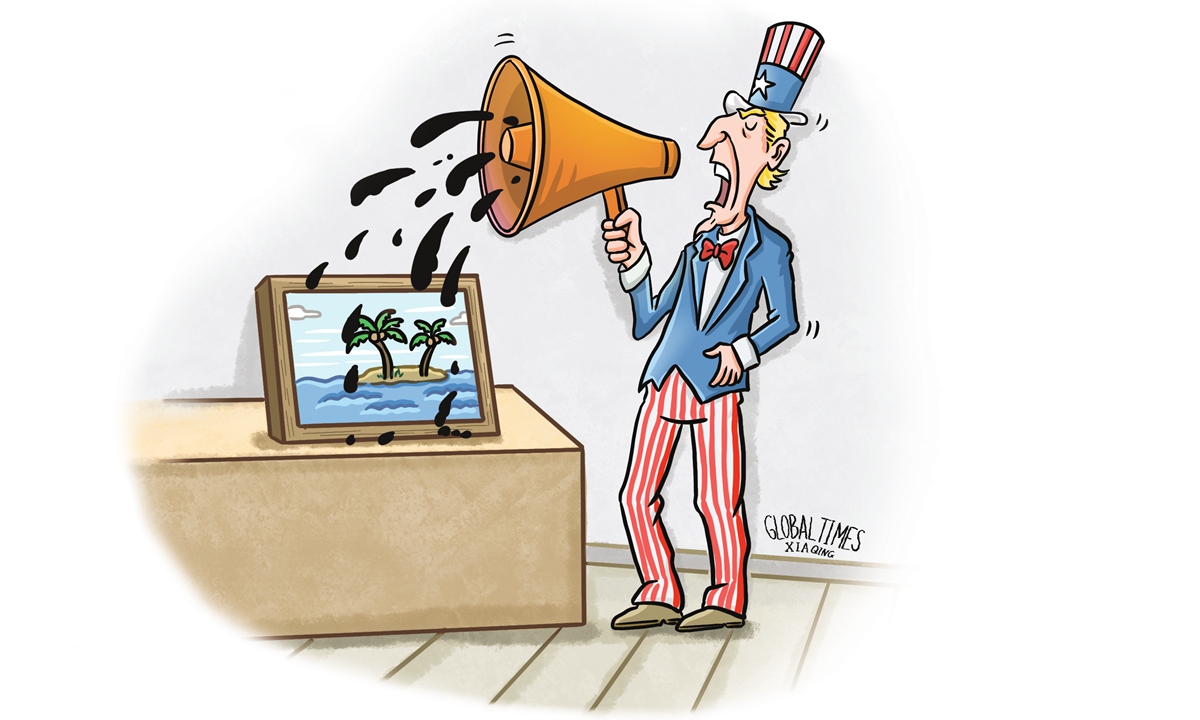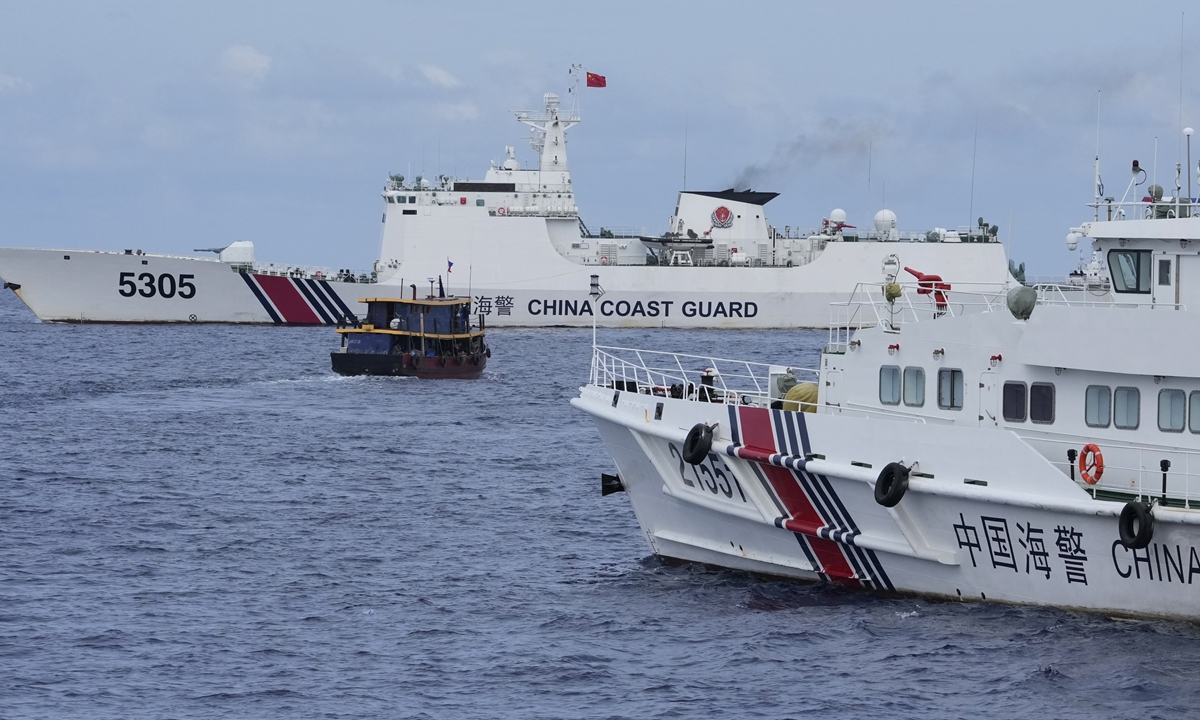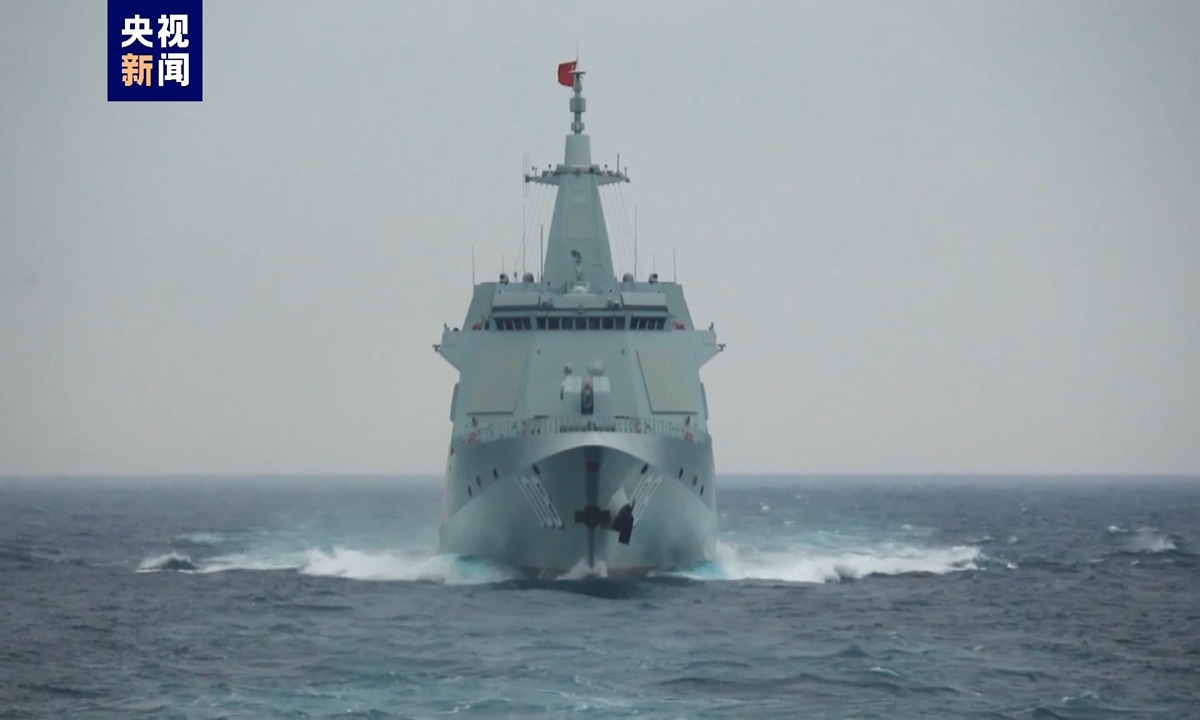
Illustration: Xia Qing/GT
The US State Department issued a statement on Tuesday regarding the situation in the South China Sea, discrediting China's policies and exaggerating maritime tensions by claiming that it "stands with our ally the Philippines." The Philippines' provocations are a repeat of the same old tricks, and the US State Department's statement is a cliché. This is not the first time, and it will not be the last. No matter what the US and the Philippines do, it will have no impact on China's legitimate claims in the South China Sea, or its determination to safeguard territorial sovereignty, as well as regional peace and stability.
The US State Department's statement can be described as an embarrassment. The reason is that Philippine President Ferdinand Marcos Jr said in an interview not long ago that although the US has been assisting the Philippines in patrolling the sea lanes, the issue of the Ren'ai Jiao (Ren'ai Reef) is "a purely Filipino concern" and the Philippines intends to solve that problem itself.
Those lies don't even need to be exposed by China. The US State Department did it itself. In the US statement, people can find three keywords, namely "freedom of navigation," "the 2016 arbitral decision" and "the 1951 US-Philippines Mutual Defense Treaty." These three are common rhetoric used by the US in recent years when talking about the South China Sea issue. They cannot stand up to logical scrutiny, but they can mislead international public opinion.
Does the Ren'ai Jiao situation really have anything to do with 'freedom of navigation'?
Freedom of navigation in the South China Sea has never been an issue. The South China Sea is currently one of the most important and busiest waters in the world, with intensive shipping activities. More than 50 percent of the world's merchant ships and one-third of maritime trade pass through it. No matter how the regional situation changes or how complicated the disputes are, normal international commercial navigation in the South China Sea has never been hindered. This is an important reference for the international community to evaluate the situation in the South China Sea.
The "freedom of navigation" that the US talks about regarding the Ren'ai Jiao situation is a false proposition. First, Ren'ai Jiao is an integral part of China's Nansha Qundao. The fact that the Philippines sent construction materials to the illegally grounded warship at the reef is an infringement of China's territorial sovereignty and a violation of the Declaration on the Conduct of Parties in the South China Sea. It will inevitably be opposed and countered by China. This has nothing to do with "freedom of navigation."
Second, in its recent communications and consultations with China, the Philippines has agreed with China to continue to properly manage maritime disputes and differences through friendly consultation and properly handle maritime emergencies, in particular, the situation on the ground at Ren'ai Jiao. But by reneging on its commitment and provoking a conflict near Ren'ai Jiao on Tuesday, the Philippines is further eroding the reputation of its government and the country.
Third, ignoring the dissuades and warnings of China's maritime law-enforcement forces, the Philippines' supply and Coast Guard vessels insisted on intruding into waters near the Ren'ai Jiao and rammed Chinese vessels in a dangerous and unprofessional manner. This violates the Convention on the International Regulations for Preventing Collisions at Sea, which is an act that threatens the safety of maritime navigation and personnel.
Is 'the 2016 arbitral decision' international law?
Since the 1970s, the Philippines has illegally occupied islands and reefs in China's Nansha Qundao, violating international law and contravening the UN Charter and the basic norms of international relations. The Philippines' unilateral initiation of the so-called South China Sea arbitration is another attempt to consolidate the country's illegal obtainment and infringement upon China's sovereignty, urged and supported by the US.
The subject-matter of the South China Sea arbitration is essentially about territorial sovereignty and maritime delimitation, but territorial matters are not subject to the UN Convention on the Law of the Sea (UNCLOS). Moreover, as provided under UNCLOS, the Chinese government has expressly excluded disputes concerning maritime delimitation from the compulsory dispute settlement procedures. The Arbitral Tribunal in the "South China Sea arbitration" violated many basic principles that international judicial and arbitration institutions should follow, acted ultra vires and failed to rectify the Philippines' misuse of the dispute settlement mechanism of the UNCLOS.
Judging from the situation in the South China Sea over the past few years, "the 2016 arbitral decision" has not only failed to provide the slightest fair and just solution to the South China Sea dispute, but it has also complicated the resolution of the already complicated issue. The decision contains a large number of errors in the interpretation and application of the law, the determination of facts and the admissibility of evidence. Despite the hype and commemoration by the US and the Philippines, "the 2016 arbitral decision" will never become an international law applicable to the South China Sea, nor will it play any positive role in the development and evolution of international maritime law.
Will threatening China with the US-Philippines Mutual Defense Treaty work?
The Mutual Defense Treaty (MDT) between the Philippines and the US is a product of the Cold War, while the issue of Ren'ai Jiao is a territorial dispute between China and the Philippines and has nothing to do with the US. Washington has repeatedly threatened Beijing with the MDT and endorsed Manila's illegal claims, contributing to the Philippines' fall into the gambler's fallacy.
The Biden administration is trying to reshape the geopolitical environment around China under the Indo-Pacific Strategy, and China's efforts to safeguard its territorial sovereignty, maritime rights and national unity are regarded by the US as "undermining" the status quo and the so-called order. Such a judgment is not based on an objective understanding of the historical and current situation, but rather on the US' deep-rooted Cold War mentality and hegemonic ideology.
Over the past year or so, the Philippines and the US have increased their strategic synergy and intensified maritime cooperation. Security cooperation in the South China Sea in the form of "maritime situational awareness," "joint air and sea patrols" and "interoperability of intelligence systems" has been rolled out between the Philippines and the Quad. In terms of the Ren'ai Jiao situation, China also knows exactly what support and means the US has provided to the Philippines and what role Washington plays.
At present, the Philippines' constant moves are also an attempt to test the reliability of the security guarantees and military support promised by the US. The Philippines even has the intention to kidnap the US by stirring up the tensions in the South China Sea. There is no greater tragedy for a pawn than to believe it is in control of the whole situation. Considering the current international situation and the upcoming US presidential election, it's impossible for Washington not to worry about a minor incident that could spark a greater conflict in the South China Sea. For the US, which believes in the "table and menu theory," the treaty may simply be a few pages meant to provide some psychological comfort to the Philippines.
The author is deputy director of the Institute of Maritime Law and Policy at the China Institute for South China Sea Studies. opinion@globaltimes.com.cn


